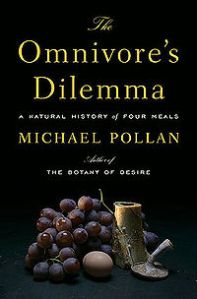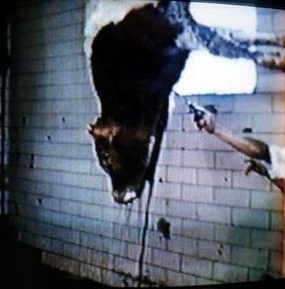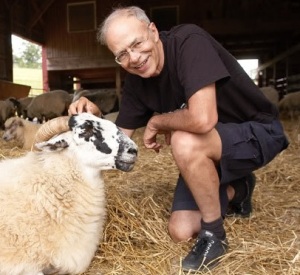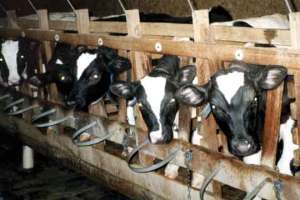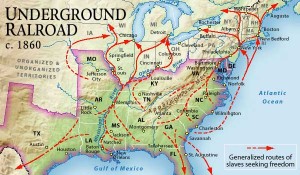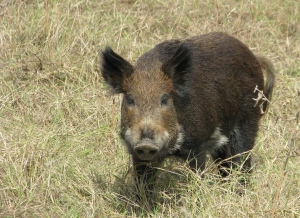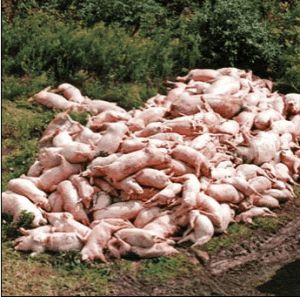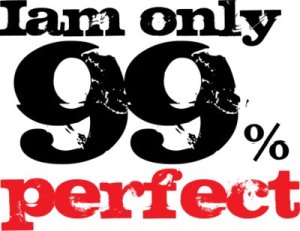In keeping with my tradition of discussing books years after they’ve been published, I bring you “The Omnivore’s Dilemma” by Michael Pollan. There’s a few things I want to get out of the way before I tell you how much Pollan annoyed me with his attitude toward animals and how it reached a point where I couldn’t believe the things this jackass was saying and doing. The things I want to get out of the way are: this is a great book, he is a great writer, and if you haven’t read it you should and almost must.
There. I feel better. Now on with the dissection.
Pollan’s book is divided into three parts. He visits a corn farmer in Iowa who grows for big ag, he visits a small farmer in Virginia whose farm is self-sustaining and designed to follow the natural order of animal and plant life, and then in the last part of the book he hunts and gathers.
Along the way he gives a pretty detailed description of the factory farm system, the big ag system, and the big organic system. And he eats a lot of meat.
He eats at McDonald’s, he kills and cooks a chicken from the small farm, and he hunts down a wild pig which, with the help of a friend, he butchers and then cooks and eats.
He leaves no doubt that he’s horrified by the treatment of animals in the factory farming system, and he throws off information I’d never heard before despite reading a lot on this topic. (He says that McDonald’s tolerates a five percent error rate when it comes to cows still being conscious as they’re cut apart on the assembly line. Almost 70 head of cattle move down one of these assembly lines PER MINUTE, and according to Pollan, McDonald’s permits 1 in 20 of them – we’re talking THREE PER MINUTE – to still be conscious when the chain saws start their work.)
In a chapter entitled “The Ethics of Eating Animals” he speaks to Temple Grandin, famous for designing the ramps and other parts of the slaughtering process, who tells him that when it comes to slaughtering cattle “there is the pre-McDonald’s era and the post-McDonald’s era – it’s night and day.” Pollan then says, “We can only imagine what night must have been like.”
And yet despite this information, Pollan says, “In the end each of us has to decide for himself whether eating animals that have died in this manner is okay. For my part, I can’t be sure, because I haven’t been able to see for myself.” HUH? You just heard about the process from the woman who designed it – do you think conditions might actually be BETTER than what she’s telling you? If not, what difference does it make if you see it for yourself or not, except for the obvious difference which is that you don’t have the image of live cows being chain-sawed to make you think twice before cutting into your next steak at The Palm.
He then goes on to compare the industrial slaughterhouse to the small family farm where he personally slit the throats of some chickens, and says it makes him realize why the small farm’s accessible-to-customers slaughtering area “is such a morally powerful idea.” And this reveals perhaps Pollan’s greatest weakness. Whenever he does something that I imagine most vegans would believe is immoral, he brings up the issue of morality to justify his actions.
How is being able to watch your chicken-provider slaughter your chicken a morally powerful idea? What he really means every time he says “moral” is “guilt-assuaging.” But his powers of denial don’t let him see it that way. To him, being able to see HOW the chicken is killed also provides the reason WHY it’s okay to kill it. But there’s really two separate things going on here. One is the issue of humane slaughter. To the extent that the chicken-farmer’s method is relatively quick and complete, then yes, it’s better than a method that leads to a drawn-out, excruciatingly painful life and death. But a painless death doesn’t equal a morally acceptable death. (And I’m not willing to concede that these deaths are painless or even near-painless.) Without explicitly saying so – since it’s probably hard for him to let his thoughts and conscience focus on this too clearly – he conveys that it’s acceptable to take this life because it’ll taste good when he eats it. The animal’s right to be free from such a killing doesn’t enter into it, yet alone a human’s right to kill another animal for this purpose. The deeper, more difficult and vexing questions aren’t even considered here.
Not that the rights of animals are never discussed. Far from it. He conducts his argument against veganism by attacking the animal rights thinkers, particularly Peter Singer. He accuses Singer and others of “argument from marginal cases.” But what’s so striking is that he’s plainly guilty of doing that very same thing.
He says that the creatures on the small farm he stayed at for a week are clearly happy, while admitting that this is “but a speck on the monolith of modern agriculture.” Yet he goes on to use this small farm as evidence that “animal rightists betray a deep ignorance about the workings of nature.” Who’s arguing from the marginal case now?
He goes on to say, “The surest way to achieve the extinction of the species would be to grant chickens a right to life.” Again, he is arguing from the margins. Let’s get to the point where the factory farms and their billions of tortured chickens are gone and every chicken is raised the way they are on the bucolic farm he visited and then we can have this conversation.
He adds that, “Predation is deeply woven into the fabric of nature, and that fabric would quickly unravel if it somehow ended, if humans somehow managed to ‘do something about it.’” But is factory-farming part of the fabric of nature? Is it natural predation that maintains a healthy eco-system? It is the opposite. And let’s not cite bison hunting as an excuse to eat meat when if I’m not mistaken that’s not how most meat is currently obtained.
I suppose you could say that I too am guilty of arguing from marginal cases, by constantly returning to the factory farm, and wanting to continue to use that as the basis by which meat-eating is judged, and I guess that’s true, if 99 percent of something is considered the margin.
He refuses to allow that the animal rights movement has developed and grown specifically IN RESPONSE to the factory farm. Thus it is intellectual fraud to keep returning to ancient predation and tiny pastoral farms to find examples to refute the “animal rightists.” His romantic notion of food is a relic, and it’s built upon a sea of horror, which while he acknowledges, he refuses to connect to his foodieism and his defensiveness of his continued consumption of animal products.
He insists on seeing animal rights as absolutist, because of course it’s easier to argue from there. But take Freedom of Speech, which the Bill of Rights says, “shall not be abridged.” But of course the Supreme Court has carved out numerous exceptions to these unabridgeable rights because society needs to be able to function without — to use a trite example — screams of fire in a movie house.
If a pitbull grabs your toddler in its jaws, Pollan would practically have you believe that animal rights advocates would insist you simply shrug and start preparing funeral arrangements. Or that you couldn’t swat that mosquito before it took your blood and left you a souvenir welt. I know I’m repeating myself but it’s flat-out stunning how he mocks arguing from marginal cases and then proceeds to do it for the entire chapter without even a hint of self-awareness. “Animal rights’ exclusive concern with the individual might make sense given its roots in a culture of liberal individualism, but how much sense does it make in nature?” By now, even though he would deny it as a complete bastardization of his thinking, one can only draw one conclusion, which is that he regards factory farming as “nature” and intends to defend his continued consumption of animal products on that basis.
He says that animal rights “could only thrive in a world where people have lost contact with the natural world.” Well, people HAVE lost touch with the natural world and that’s why animal rights IS thriving. There was no Underground Railroad without slavery!
It seems to me that until we are in a situation where the small-farm meat that Pollan saw and produced himself when he personally slit chicken’s throats is widely available we don’t need to have this argument. A conversation in 1943 about whether the statement “Jews are good at business” is a compliment to Jews or an example of anti-Semitism would certainly not have been an excuse to let the Holocaust rage on. Pollan recognizes factory farm conditions for the nadir of humanity that they are, yet he still eats at McDonald’s in the book. And while I’m sure that’s not his usual favorite dining spot, how often does he know the providence of the eggs used in the gourmet items I’m sure he consumes at fine restaurants on a regular basis. Same for the items he makes or consumes when he’s home.
I’ve no doubt someone like him, a foodie, especially one with an open eye to factory farm conditions, goes out of his way when he can to buy from small farms where he thinks and hopes the conditions didn’t veer into evil. But what’s the percentage of his eggs, dairy and meat that’s produced that way?
If he’s made a total commitment to ONLY eat eggs, meat and dairy whose sourcing he’s certain of, then I don’t have nearly as big of a problem with what he’s doing. At that point, he’s doing much more than most people alive today will ever do. But I find it hard to believe that’s the case.
The final part of the book is about “hunting and gathering.” He gathers mushrooms and he hunts a wild pig, which I found confusing given his earlier statement about the potential extinction of chickens.
He bases his whole justification for eating meat on the domestication of the animals and the fact that the chickens on the bucolic farm wouldn’t have gotten the chance to live what he believes to be a good life if not for their being raised for food, and then he goes out and shoots a wild pig. And he says the pigs seem to roam in a group of six, with maybe three such groups in the forest. So thinning the herd can’t be a justification.
So then what’s the justification for killing one of these pigs, which he’s already described as more intelligent than dogs? What’s the justification for the sorrow that might come to the mother or baby of the pig he killed? The justifications he offered for eating meat aren’t even recalled and then tossed aside – they’re long forgotten.
He stretches to justify his hunting of pigs by saying, “They rip up great swaths of land with their rooting, exposing it to erosion and invasive weeds.” This is exactly the kind of natural process he glorifies earlier in the book, but now, needing to feel better about shooting an intelligent animal in the face, he grasps for pejoratives like “erosion” and “invasive.”
Later, while butchering and eating the pig with his friend, he says, “Eating it at Angelo’s kitchen table, even amid the raw cuts of meat arrayed on the counters around us, I suddenly felt perfectly okay about my pig—indeed, abut the whole transaction between me and this animal that I’d killed two weeks earlier.” Well I’m glad you felt okay about “your” pig — and what exactly was this transaction between you and “your” animal? That you get to eat it and in exchange it gets to be killed?
He adds, “Now it was all a matter of doing well by the animal, which meant making the best use of its meat by preparing it thoughtfully and feeding it to people who would appreciate it.” How does this do well by the animal? Once the animal is dead, it doesn’t give a shit if it gets eaten or tossed into a Dumpster or thrown into the sea. What you really mean is that it was a matter of doing right by you, or more specifically, you’re conscience, by not feeling that you wasted its life since you were the one to take that life away from it.
This whole chapter is a serious of ridiculous statements. He goes to such great lengths to justify and rationalize his consumption of meat and other animal products that you feel like you’re his shrink sitting there while he prattles on and on in a manner that you can’t imagine even he finds convincing.
— “Another thing cooking is, or can be, is a way to honor the things we’re eating.” Please, don’t anyone ever honor me this way, okay?
— “But cooking doesn’t only distance us from our destructiveness, turning the pile of blood and guts into a savory salami, it also symbolically redeems it, making good our karmic debts: Look what good, what beauty can come of this!” So killing someone would be okay if we made a beautiful painting with their blood?
— “…it was cheering to realize just how little this preindustrial and mostly preagricultural meal had diminished the world. My pig’s place would soon be taken by another pig.” This is pig as commodity, as widget. Otherwise you can say the same about human life. I killed this baby, but another baby will be along soon enough.
— “Under the pressure of the hunt, anthropologists tell us, the human brain grew in size and complexity.” How is this an argument for meat-eating? Certainly nowadays it’s much harder to hunt down a vegan meal than to find a meat one, no?
WHAT HE NEVER COMES OUT AND EXPLICITLY SAYS IS: I KNOW IT’S WRONG AND I DO IT ANYWAY.
Instead it’s page after page of convoluted rationalizations not worthy of the intelligent person who wrote the rest of this book. But hey, that’s easy for me to say, I don’t eat animals anymore. And it’s also “easy for me to say” in the sarcastic way because I did the exact same thing he did, for almost half a hundred years.
I think Pollan’s problem, which goes completely unacknowledged by him, is that as a foodie he wants to hang with a certain crowd. He’s a celebrity in that crowd, and he enjoys that status, I’m sure. He’s not about to invite the disdain and wrath of that crowd and risk exclusion by turning down much of what they offer, or eating side dishes when joining them at “fine” restaurants, or, god forbid, pointing out to them as they raise the fois gras to their lips that they really shouldn’t be doing that. That it’s MORALLY WRONG to be doing that. And that they all need to think twice about making any dish that requires cracking a few thoughtlessly acquired eggs.
Which raises the question of whether Pollan, someone whose eyes are no longer averted, someone aware of the full horrors of how, in his own words, all but a speck of current food is produced by a system that regularly, intrinsically inflicts brutal torture on the animal lives used to produce it, is worse than someone who either doesn’t know or more likely sort of knows or has a pretty good sense of it, but shuts themselves off from further consideration of the matter.
